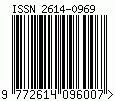PERLINDUNGAN ANAK HASIL ZINA DALAM PERSPEKTIF HUKUM ISLAM DAN PUTUSAN (MK) NO. 46/PUU-VIII/2010
Kata Kunci:
Protection, Child zina, Islamic Law, Constitutional Court (MK) Decision No. 46/PUU-VIII/2010Abstrak
Due to the development of the times and technology is increasingly sophisticated, there are often things that violate Islamic law, many in Indonesia, there are often cases of adolescent adultery that can cause death and damage light morals in children today. The formulation of the problem of this study is the protection of adulterous children in the perspective of Islamic law, the protection of children resulting from adultery in the perspective of the Constitutional Court (MK) decision No. 46 / PUU-VIII / 2010, and similarities and differences in the protection of adulterous children in the perspective of Islamic law and the decision of the Constitutional Court (MK) No. 46/PUU-VIII/2010. The purpose of this study is to determine the form of protection of adulterous children in the perspective of Islamic law and the decision of the Constitutional Court (MK) No. 46 / PUU-VIII / 2010 and to find out the similarities and differences protection of adulterous children in the perspective of Islamic law and the decision of the Constitutional Court (MK) No. 46/PUU-VIII/2010. The method used in this study is a type of research (Library Research) which is sourced from primary data from the results of analysis of the Qur'an and Hadith related to the protection of children from adultery in perspketif Islamic law and the decision of the Constitutional Court No. 46 / PUU-VIII / 2010, as well as secondary data sources in the form of books, journals, scientific papers aricles and theses through the internet that are related with the problem under study, then the data is analyzed through several stages through data reduction, data analysis, and finally conclusions are drawn. Protection of adulterous children in the perspective of Islamic law, states that children born out of wedlock (adulterous children) have a civil relationship to their mother and their mother's family. This means that children born out of wedlock (adulterous children) cannot get civil rights such as inheritance, guardians, and livelihood, absolutely against the man who fertilizes his mother, even though the man has done "recognition" or has been scientifically and technologically proven as his father. Protection of adulterous children in the perspective of decision (MK) No. 46 / PUU-VIII / 2010 that children resulting from adultery can have a civil relationship not only to their mother and their mother's family, but also to their mother and their mother's family, but also had a civil relationship over the man as his biological father and his father's family. while the difference in the protection of adulterous children, in Islamic law, the child of adultery has a civil relationship with his mother and his mother's family. this means that in civil rights such as inheritance, guardianship, and living, the child from adultery can only get these rights from his mother. Meanwhile, in the decision of the Constitutional Court number 46 / PUU-VIII / 2010 that the adulterous child has a civil relationship with his mother and his mother's family, as well as a man as his biological father that has been proven by science and technology or other legally justified evidence.
Unduhan
Unduhan
Diterbitkan
Terbitan
Bagian
Lisensi
Hak Cipta (c) 2025 AL MUNAZHZHARAH

Artikel ini berlisensiCreative Commons Attribution-NonCommercial-ShareAlike 4.0 International License.



















